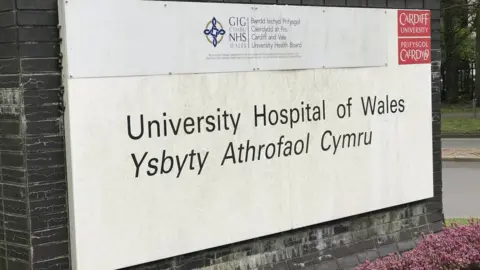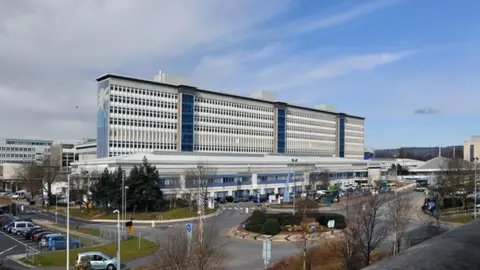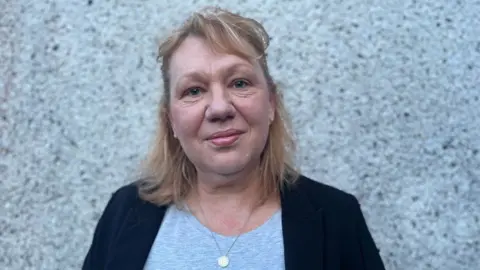Cardiff: Health board on high alert over winter pressures
 BBC
BBCA health board has declared the highest level alert due to winter pressures.
Cardiff and Vale University Health Board announced it was "experiencing significant and sustained adverse demand on services".
It said the impact was hitting its emergency department at University Hospital of Wales hardest.
The Welsh government said it was investing in same day care and community beds to help patient flow.
A spokesperson for Cardiff and Vale University Health Board said it had declared an internal business continuity incident - the highest level of alert for seasonal pressures.
This was exacerbated by limited bed availability due to elongated patient stays in hospital, they said.
"This sustained pressure continues to present challenges to the way we deliver patient care," they said.
They urged members of the public to only attend the emergency unit "in cases of a genuine life-threatening emergency which requires immediate medical intervention".
A similar plea was issued by the health board in May, as it faced "unprecedented levels of pressure".
"At this stage, there is no disruption to elective and clinical appointments which continue to operate as usual," they added.
Currently, Cardiff and Vale is the only health board on the highest alert level. In 2022, winter pressures reached a stage where all seven of Wales' health boards had declared this level of escalation.
But Swansea Bay University Health Board said on Wednesday afternoon that Morriston Hospital was "under extreme pressure", and its emergency department staff were "dealing with high volumes of very sick patients".
"If you have a minor injury or illness, you are likely to face a very long wait if you come to the ED," it said.
"Please consider alternative ways to get help."
 Mick Lobb/Geograph
Mick Lobb/GeographMeriel Jenney, medical director at Cardiff and Vale health board, told BBC Radio Wales' Breakfast programme that a "combination of factors" had led to the change in status.
"On this occasion it was a combination of a very large number of patients presenting, many of who were frail and requiring more complex care, together with a large number of patients within the organisation that we needed to move through and discharge," she said.
She said she was "optimistic" that de-escalation could happen later on Wednesday, but would not occur "until we're sure we can sustain it".

Has a Welsh hospital issued a Black Alert?
The term Black Alert is sometimes colloquially used to describe this highest escalation, but it is not an official term used by health boards.
Each of Wales' health boards has five levels of escalation which determine how pressured its services are.
Business continuity is the highest level of alert a health board can declare when it comes to coping with seasonal pressures.
However, there are exceptional circumstances in which hospitals could declare major or critical incidents.

Helen Whyley, director of the Royal College of Nursing Wales said "the reality is this pressure is here all year round".
She told BBC Radio Wales' Breakfast programme: "In Cardiff and the Vale what members are telling us is that it is very very challenging. They feel stressed, they feel the pressure coming in for a number of reasons."
She said pressure on hospitals was having a knock-on effect across the healthcare system.
"We don't have time to keep talking. We need to see action. Without it, our system is not just creaking, it is buckling," she said.

The Welsh Ambulance Service acknowledged the incident but said it was grateful the health board was "minimising the impact" on its work.
Lee Brooks, executive director of operations, reiterated the plea to the public that they only attend the emergency department "if absolutely necessary".
A Welsh government spokesperson said: "We are investing in same day emergency care and extra community beds as well as integrated solutions with social care services to improve patient flow through hospitals; and tackle ambulance handover delays."
